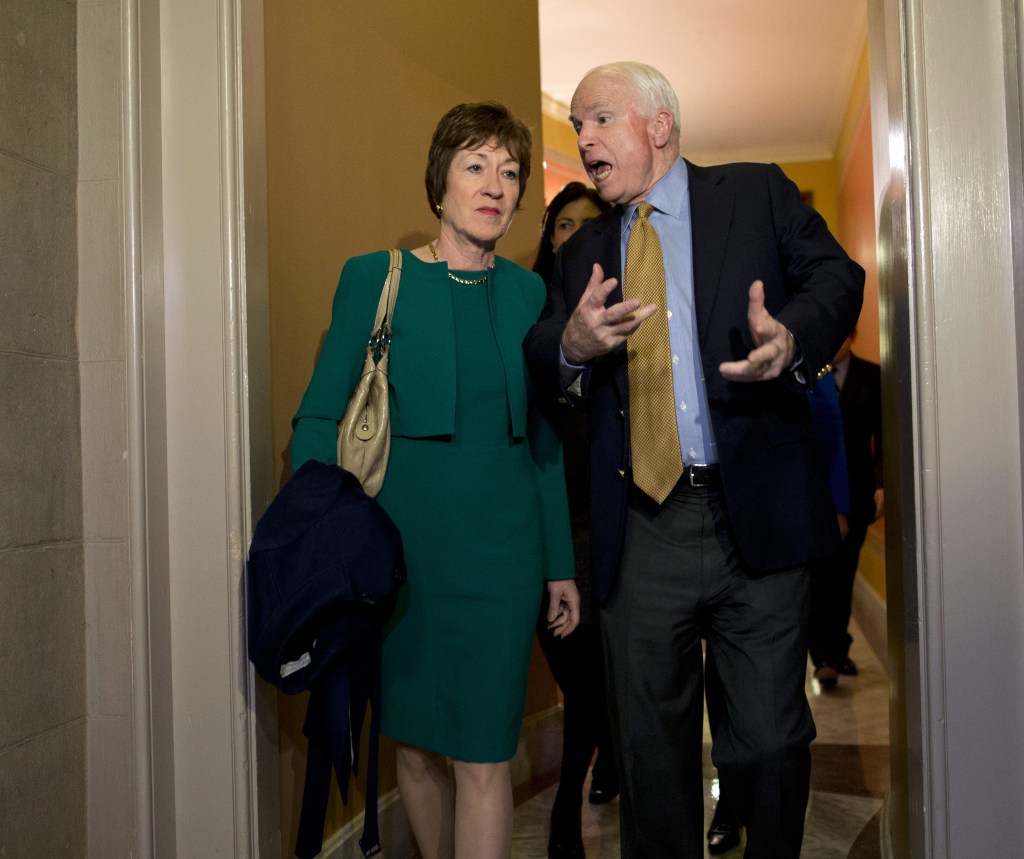Can Susan Collins’ moderation save the day?
This weekend, as Republicans on both sides of the Capitol struggle for a path out of the latest Capitol Hill crisis, Sen. Susan Collins has emerged, once again, as a key player in any potential solution.
The senior senator from Maine is a regular on the list of Republican lawmakers invited to the Obama White House when compromise is in the offing on a wide range of issues, from economic stimulus to gun control.
Friday was no different. Collins’ most recent foray into legislative diplomacy is a 23-page proposal that would end the government shutdown, extend government funding for six months with sequester-level spending cuts, repeal a tax on medical devices and raise the debt ceiling until the end of January.
She presented it to President Barack Obama when a small group of Republican senators came to the White House to explore ways to reopen the federal government and raise the nation’s debt ceiling to avoid default.
The Collins plan is one of several under consideration by Republicans and Democrats as the budget crisis entered it’s second weekend, but it is the one that may have the greatest chance of providing a solution. While House Republicans have been slow to commit to any framework, Senate Republicans and some Democrats seemed open to the approach Collins presented.
“Susan has done us all a great favor by having the courage to come up with the . . . amendments,” Sen. Orrin Hatch, R-Utah, said.
If the measure is able to attract enough bipartisan support in the House, it could give Speaker John Boehner, R-Ohio, the ability to avoid putting a measure on the floor that could only pass with overwhelming Democratic support.
Collins said Friday that Obama expressed interest in several points but did not embrace the plan.
“He clearly knew about elements of it. He described it as constructive but certainly did not endorse it,” she said. “I don’t want to give the impression that he said, ‘What a great plan, let’s go with it,’ because he did not.”
This kind of careful language is a Collins trademark. She has built a reputation as a moderate swing vote in a party where there are fewer of those than there used to be, and that has boosted her role as a broker during these very partisan times.
“She’s always in the middle because she makes such an earnest effort to shape the outcome and because she spends so much time and energy being a trusted player,” said Dan Demeritt, a Maine-based political consultant and former Collins aide. “She doesn’t grandstand.”
Freshman Sen. Angus King, I-Maine, who defeated her in the 1994 gubernatorial race, said that, while he has long respected Collins, working with her in the Senate has caused her to grow in his estimation.
“She is very smart, very tenacious, knowledgeable about how this place works and, I think, is truly a moderate in the best sense,” he said.
King said Collins’ middle-of-the-road approach is in the tradition of Maine senators and is what residents of the Pine Tree State have come to expect.
When she last faced the voters in 2008, Collins crushed her Democratic challenger, former Rep. Tom Allen, by 22 percentage points. Her popularity remains high even as Republicans nationally have seen their approval ratings drop.
A recent poll released by Critical Insights, a polling firm based in Portland, showed her with a 69 percent approval among Maine voters. The poll was taken before the government shutdown.
Stu Rothenberg, editor of the Rothenberg Report, said Collins’ ability to “clobber” serious opponents has caused Democrats to shy away from spending money to beat her.
“Maine voters simply like her and trust her,” Rothenberg said. “She has been independent enough over the years so that Maine voters don’t think she is part of the D.C. problem, and they see her as pragmatic, not ideological.”
Still, she frequently finds herself attacked, from both the left and the right.
Collins was one of several Republicans targeted by the Senate Conservatives Fund, which tried to pressure Senate Republicans into attaching to a federal budget measure language to defund the Affordable Care Act. Collins rejected the defunding effort.
Collins said the politics of the moment are irrelevant and her current motivation is to solve problems and reassure the American people.
“There’s no doubt that the Republican poll numbers are appallingly bad, but the Democrats are going down also,” she said. “But there’s a more important issue here than poll numbers, and that is about our ability to govern and to show the American people we can do what is right and that we care about them.”
Copy the Story LinkSend questions/comments to the editors.



Success. Please wait for the page to reload. If the page does not reload within 5 seconds, please refresh the page.
Enter your email and password to access comments.
Hi, to comment on stories you must . This profile is in addition to your subscription and website login.
Already have a commenting profile? .
Invalid username/password.
Please check your email to confirm and complete your registration.
Only subscribers are eligible to post comments. Please subscribe or login first for digital access. Here’s why.
Use the form below to reset your password. When you've submitted your account email, we will send an email with a reset code.